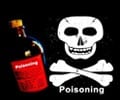A first of its kind child poison emergency hotline was launched today morning at Mehta Children’s Hospital in Chennai, South India, aimed at providing quality information and Emergency treatment advice for the public and health professionals 24x7.
The number +91 44 42876977 dedicated for the poison information lines, is backed by a team of doctors and specialists ready to treat children in case of emergency. Trained nurses and pharmacists will answer the phone calls and suggest the best line of treatment. GPs and child specialist doctors will have confidential access to a medical expert who can answer questions about poisons or help users to treat a poison exposure.Dr. T.N. Manohar, President, Indian Academy of Pediatrics, CCB, who inaugurated the Pediatric Poison Information in Chennai today, said it was appropriate that the information center was launched on Doctors’ Day because there is a felt need for a kiosk that will disseminate information on the subject of toxicology and methodology of treatment in the Indian context where information is scant and there are no Indian statistics on cases of child poisoning. 1 million cases of poisoning are reported in the US each year, of which 50% are pediatric poisoning, 75% of which are non-toxic and 25% are toxic.
While the poison factors have dramatically increased in recent years in India too, things get complicated in cases where the child accidentally swallows something poisonous and a caretaker or family member won’t reveal the toxin, fearing they will be pulled up for negligence. It is a struggle for GPs and child specialists to treat emergency cases of child poisons when they are clueless as to the nature and toxicity of the substance consumed that could even prove fatal to the child if not diagnosed and treated speedily.
Speaking on the occasion, Dr. Thangavelu of Mehta Hospitals mentioned Louis Gdalman, pioneer in hospital pharmacy poison information, who established the first poison information service in the US at St. Luke’s Hospital in the 1930s. The first national poison information center in India was launched in 1995 at AIIMS. Dr. Thangavelu said the aim of the Pediatric Posion Information Center at Mehta Hospitals was to provide immediate information on early diagnosis and emergency treatment for doctors who call at these lines.
Public who call this number would be directed to seek immediate medical assistance and request their health attendant to reach this emergency number if they needed further help. The information desk would help medical personnel reduce the morbidity and mortality related to poisoning. The info desk has a voice recorder to record and document the contact details and the help desk will redirect the calls to two nodal desks to ensure that no calls are left unattended.
Dr. M. Kannagi. Director ICH &HC (Institute of Child Health and Hospital for Children) released a booklet on Interesting and Rare Cases in Pediatrics which was received by Dr. R. Shanmugasundaram, Head, Neonatal, Mehta Group of Hospitals. Dr. M. Kannan, Medial Administrator Mehta Group of Hospitals welcomed the gathering. Mr. Sameer Mehta, Director Mehta Group of Hospitals thanked the doctors for the initiative and hoped the services would benefit many people seeking direction in poison treatment.
Equipped with experience of treating a variety of poisoning cases and backed by a years of research by a dedicated team of doctors and researchers, the 24 hour emergency hotline for poisoning incidents and poison information for public and healthcare professionals should hopefully reach a wide section of the Indian population to help families in distress and keep children safe.












